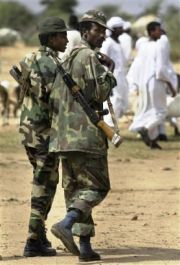Arab militias rampage unchecked in Darfur
OTASH CAMP, Sudan, April 19 (Reuters) – Arafa Abdullah Hadi hid for a week in a dry creek outside her Darfur village, fearing the Arab militiamen she saw shoot dead her two uncles and brother-in-law would come back.

|
|
Soldiers in a miltary unit calling themselves variously the Border Intelligence Division, Second Reconnaisance Brigade, or the Quick and the Horrible, also believed to form part of the Janjaweed militia, walk around the weekly animal market in Mistiria in North Darfur, Sudan, Tuesday, Oct. 5, 2004. Mistiria is the home town and base of Musa Hilal, the alleged coordinator of the militia known as the Janjaweed who have been accused of committing atrocities in the conflict in Darfur. (AP). |
Arab militias, known as Janjaweed, rampaged through Hadi’s previously rebel-held town of Khor Abeche in South Darfur state 11 days ago, burning, killing and looting all in their path.
“They came early, at 6 a.m.. I heard the screaming first and then shooting,” Hadi, 19, said.
She ran outside with her family to see the Janjaweed turn up on horses and camels and in vehicles with machine guns on top.
They killed about 30 people that day, she said, dressed in a colorful wrap but shyly covering her face.
After hiding in the dry river bed with her family, Hadi walked for six days without food to the nearest safe camp, Otash, on the outskirts of Nyala town, South Darfur’s capital.
Violence plagues Darfur more than a year after the Arab-dominated government and two main non-Arab rebel groups signed a cease-fire.
No planes or helicopters were used in the Khor Abeche attack, but witnesses accuse the government of involvement and cooperation with the Janjaweed.
Both army and Janjaweed use vehicles and they wear the same green khaki uniform, the Khor Abeche survivors say. But the Janjaweed wear red cloth bands around their heads.
The bloodshed on April 7 finished off Khor Abeche, which had come under attack many times, residents said. About 25,000 people were displaced.
Al-Hajj Osman al-Hajj left after the first attack on Khor Abeche in January. Then, he said, rebels were in town who fought off the Janjaweed and government.
“We killed 20 Janjaweed and about eight from the army,” he said. The dead Janjaweed carried different identity cards to the army and were all Arab from the local Misiriyya tribe. The army soldiers killed were from tribes throughout Sudan.
“There were even black Africans among the dead army soldiers — that’s how you know the government are still working with the Janjaweed,” he said.
The African Union and United Nations condemned the Khor Abeche attack and referred the name of the Janjaweed commander to the Security Council for a possible travel ban and asset freeze, unlikely to deter a tribal leader in remote Darfur who would rarely leave the country.
Sana Abdallah came the previous day to Kalma camp outside Nyala. She stayed through many attacks, but was forced to leave after the April 7 offensive.
“Everything was gone. Now there’s no one left there. This was the end for me, there was nothing to stay for,” she said.
PERILOUS ROADS
The road to Nyala from the north is perilous and Janjaweed and bandits roam and loot at will. Two aid workers were shot dead by bandits on the road last year.
Hadi and her cousin Hannan were attacked and robbed along the way. “They killed two of our group and stole all our things at gunpoint,” Hannan said. “We came here practically naked — with nothing,” she said.
Hajj said those who even got there were the lucky ones.
“There are still people — even my family — who are wandering the wadis and cannot get to safety,” he said. “There’s just no security — the Janjaweed are everywhere,” he said.
Hadi said she wanted nothing more to do with the government after the attacks. Her brother joined the rebels last year and, though she has not seen him since, she is proud of him.
“It’s good — he’s defending his land and his people. I’m happy he’s gone,” she said.
